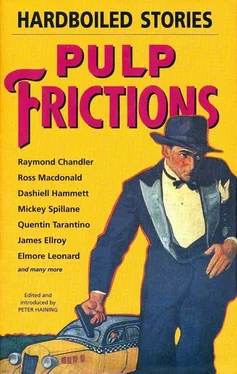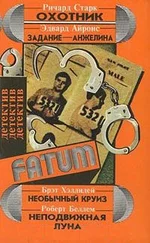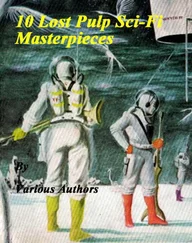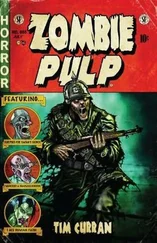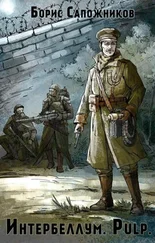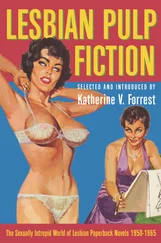‘A cinch,’ he grinned. ‘This is sure old Jake’s spot.’
Old Jake Connti, whom Mike was stalking, had a strange racket. He was a bootlegger who smuggled American alcohol into Canada, selling it there at a modest two hundred per cent profit. He wasn’t a gunman, not even a gangster. In fact he was rather a respectable, married man. His wife, Dolly, was much younger than he, and it was because of Dolly and a matter of several thousand dollars that Old Jake was now driving towards his death. Mike Halpeny had been a driver for Jake until a month before, when Jake had learned that the younger man had been stepping out with Dolly. Jake had led Mike into his warehouse and there had given him a most deliberate and exhaustive beating.
Mike Halpeny looked strange kneeling there behind the tree roots. His suit was light blue, his socks and tie a still lighter blue, and his shirt was white with fine blue stripes. He wore low shoes of black and white leather. He crouched in silence, but his appearance seemed to make a clamour amid the dignified stillness of the forest.
In a few minutes this stillness was rudely shattered by the noise of a motor.
The big truck came into sight on the opposite crest. It lumbered down the short slope, then almost stopped as Jake changed gears at the log bridge. Jake was bending over the wheel staring down at the rough bridge. He had a half of a black cigar in his mouth, and was talking to himself in a grumbling sort of way common to lonely men. He had almost crossed the bridge and had changed gears when suddenly a small black hole appeared as if by magic right in the middle of his forehead.
The truck acted as if it had been struck a vital blow. It lurched and went careening off the road. As it whirled to its side Jake’s body went hurtling through the air, landed on the edge of the gorge and fell to the bottom.
Mike was cursing. Twenty feet below him he could see the dead body of Jake sprawled comfortably against the far side of the narrow gully. Jake had fallen so that he was leaning against the wall; his left arm had caught on a snag of rock, and this held his hand in an odd beckoning gesture which was lost upon the unimaginative Mike.
Mike had to run up the little valley nearly a hundred yards before he could get down to where Jake was, but once there the rest was easy. The roll of bills was in a chamois bag under Jake’s left arm. He rifled through these rapidly, grinned with satisfaction, then turned and ran up the gully.
Now came the bright part of Mike’s plan. It really was Dolly’s idea. ‘Put the gun where it will never be found,’ she had said. So when Mike crawled out of the gully he went straight into the woods. He roamed around more or less aimlessly looking for a spot that would be easy to dig into. A little more than a hundred yards from the edge of the woods he found a tiny open space carpeted with soft, rotted leaves. Using his hands and the rifle he dug down a foot or more and carefully buried the weapon.
Then, flashing his light among the spectral trunks of the birches, he started to trot away. He wove back and forth among the trees, following the spot of light. In a little while he began to run. In less than five minutes he knew that he should have come to the road long ago. Well, the remedy was easy. He turned and ran the other way. It seemed to him that he ran that way for an hour. No road. He was becoming panicky.
Mike Halpeny was a very smart young man, but he did not know that a human being cannot walk in a straight line unless he has something to guide him or unless he is walking on a marked path, such as a city pavement. A man who doesn’t know enough to walk towards two selected objects, keeping them in line, will walk in a circle or change his direction at every feature of the ground.
So Mike simply wandered. Once in the middle of the night he had sense enough to sit down and try to reason himself out of his position, but the more he thought the more frightened he became. He got up and started circling a tree, and counting. At ten he halted and started to run madly in the direction he was facing. He ran until he was exhausted. At this time, though he didn’t know it, he was not twenty feet from the road and less than fifty from his car, but when he started again he went off at an angle to the right. After that he roamed at diverging angles and in steadily decreasing circles until dawn.
Just at sunrise he came out of the woods into a little open space. He didn’t recognise the place, but just to be out of the woods was such a relief that he gave a hoarse cry and ran down the rough slope. Suddenly the ground seemed to open under him. He dove out headfirst into a rocky gorge.
Hours later Mike Halpeny awoke with the hot sun beating down on his bare head. He was lying among small, blood-covered rocks. He tried to say, ‘Where am I?’ but his lips wouldn’t move. He tried to move his legs, but though he could see them, it was as if they weren’t there at all. He couldn’t even move a foot. He found that he could move his head slowly. To the left stretched the bottom of a dry gulch, covered with rocks. He saw a white butterfly floating about idly. He moved his head slowly to the right.
Within a few feet of him sat Jake Connti, his left arm still hanging to the snag and having that queer beckoning gesture.
Mike Halpeny had travelled the inevitable circle of the lost.
Get a Load of This
James Hadley Chase
Sex, violence and gangsters were also the basic ingredients of the stories written by James Hadley Chase who, from 1939 until the early Eighties, was known as ‘the unchallenged British champion of the American hardboiled school’. The title of Chase’s debut novel, No Orchids for Miss Blandish, is today familiar to millions of people who may never even have heard his name — a fact which owes much to the notoriety the book earned on its publication just as the Second World War was breaking out. Several critics were so outraged by the story about a millionaire’s daughter kidnapped by a brutal mob of gangsters who then torture and rape her, that they demanded it should be banned from sale. Even the outspoken George Orwell — who a few years later would write the controversial novel of the future, 1984 — published an essay, ‘Raffles and Miss Blandish’, in which he called the work ‘sordid and brutal’, adding: ‘The book contains eight full-dress murders, an unassessable number of casual killings and woundings, an exhumation (with a careful reminder of the stench), the flogging of Miss Blandish, the torture of another woman with red-hot cigarette ends, a strip-tease act, a third-degree scene of unheard of cruelty and much else of the same kind.’
With such publicity, and the terrors inspired by the German bombing of Britain during the Blitz which made people eager for any form of escapism, it is perhaps not surprising that the book sold over a million copies in the next few months and had reached a grand (though by no means final) total of over five million by the end of the next decade. The trials of Miss Blandish became, in the words of another article, ‘one of the best selling mysteries ever published’ and assured its author’s fame.
For all the seeming authenticity of this hardboiled novel and the 80 or so which followed it, the fact remains that James Hadley Chase, whose real name was Rene Lodge Brabazon Raymond (1906–1985), had never visited America or even come into contact with a genuine gangster when he began writing. Born in Ealing, West London, the son of an army officer, he was briefly a door-to-door encyclopaedia salesman before becoming the distribution manager of a book wholesaler. It was here that he realised the demand among British readers for the thrillers of Hammett and Chandler, and after reading James M. Cain’s The Postman Always Rings Twice decided to write a hardboiled novel himself. A newspaper report he came across about the infamous American Ma Baker and her killer sons is believed to have provided the inspiration, and after six weekends of intensive work, aided by an atlas of the United States, several guide books and a dictionary of American slang, he had completed No Orchids for Miss Blandish (a title that is said to have come to him while he was in the bath!). The success of this book led in 1942 to an adaptation for the London stage, and it was later filmed twice, in 1946 and 1971.
Читать дальше
